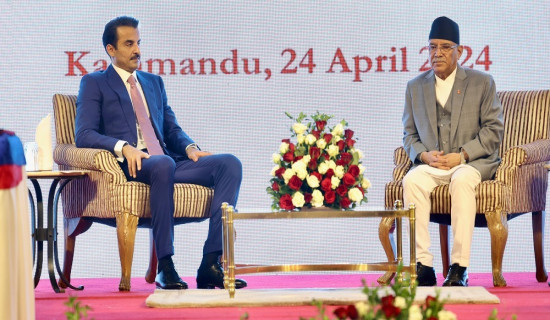- Wednesday, 24 April 2024
Monetary policy timely, but implementation challenging: CBFIN
Kathmandu, July 27: Confederation of Banks and Financial Institutions Nepal (CBFIN) has said that the monetary policy has adopted timely policies to bring the economy back on the right track.
Presenting the view over the monetary policy, the CBFIN said that monetary policy has adopted strict policies to maintain economic and financial stability and bring back the declining economy to the right track in order to facilitate the current situation where Nepal's economy is becoming uncomfortable as the important indicators of the economy are moving towards the negative direction.
Although the monetary policy issued with the goal of making a self-sufficient economy with special emphasis on increasing production and productivity remains positive overall, it expressed its view that the achievement of the goals set by the monetary policy and the implementation of some of the measures adopted for the improvement of the current economy will be challenging.
In a situation where there is a negative impact on Nepal's economy due to various issues seen in the external sector, it is challenging to increase investment in the productive sector in order to maintain economic stability, keep price inflation within limits, maintain foreign currency reserves and balance of payments and import substitution, it said.
Issues such as increase in bank rate, increase in the limit of cash reserve ratio and statutory liquidity ratio, regulation of the margin to be kept for imports, contraction in the credit limit will make it more difficult to manage liquidity and expand investment in the productive sector to replace imports and build a self-sufficient economy, it said.
The CBFIN has requested all stakeholders to cooperate for the successful implementation of the provision and monetary tools of monetary policy to make the economy stable.
Monetary policy fails to motivate private sector: FNCCI
Similarly, the Federation of Nepalese Chambers of Commerce and Industry (FNCCI) expressed its view that the monetary policy will put additional pressure on the liquidity situation seen in the market for about eight months.
It seems that the central bank, which is forecasting to provide less loans by about 7 percentage points than last year, has adopted a policy to absorb liquidity from the market and increase the interest rate of loans by reducing consumption.
Rather than increasing the source of foreign exchange earnings, the policy trend is towards reducing expenses by controlling credit, FNCCI said.
Provisions such as reducing the interest rate on loans in the productive sector compared to other businesses, maintaining refinancing facilities for businesses heavily affected by COVID-19, and re-organisation facilities for small entrepreneurs are positive, it said.
The monetary policy could not encourage the private sector because it has no concrete measures to reduce the lack of capital in the market.
The policy has not been able to cover the concrete measures of import substitution and export promotion.
As the private sector investment will also shrink due to strict policies, it will be challenging to achieve the economic growth rate of 8 per cent as targeted in the budget, FNCCI said.















